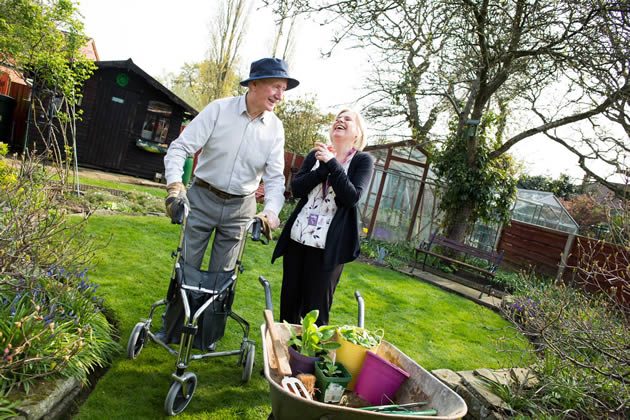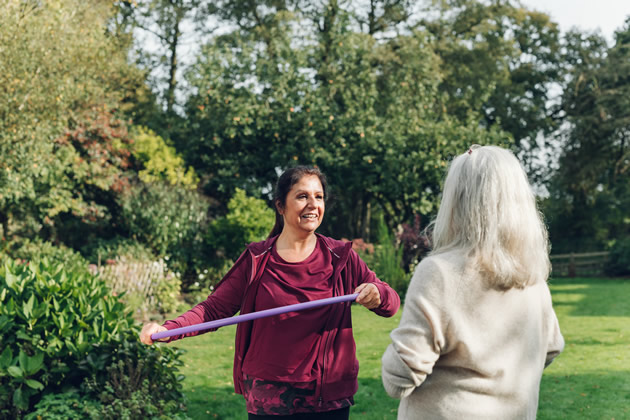Spring -Summer Heat and the Elderly
Tips to stay well in the hot weather from Home Instead Hammersmith and Chiswick (Ad)

Expected Spring heat waves and summer just around the corner, for a lot of our elderly clients, the risk of developing heat-related illnesses can increase. This is especially true during the hot weather, and more so if it stays too hot for too long. Heat and the elderly is, therefore, a topic that here at Home Instead, we feel is important to address to help our clients and their families prepare. By using sound judgment and by taking the relevant precautions, we can all ensure that summer remains a safe and enjoyable time for all our elderly clients and loved ones.
Why are the elderly at risk?
Older people are at increased risk of developing heat-related illnesses because the ability to respond to summer heat can become less efficient as the body ages . This means it is easier for older adults to become dehydrated, for example. Those who already suffer from existing health problems, including chronic conditions that affect the heart and breathing, could also be at an increased risk of overheating.
How can the heat impact the elderly?
Heat-related illnesses that can affect senior citizens can be milder or more serious, depending on the symptoms. These can include:
- Heat stress , which can result in more serious conditions, like heat stroke or heat exhaustion.
- Heat cramps or rashes .
- But also, heat fatigue or exhaustion, which can manifest itself with heavy sweating and a rapid pulse and can result in your body overheating.
- Heat syncope or fainting .
- And heat stroke or sunstroke, which is a severe heat illness that can result in body temperature greater than 40 degrees Celsius (or 104 Fahrenheit). A heat stroke is a medical emergency.
What are the warning signs and symptoms?
If you are a carer for an elderly relative, it is particularly important that during hot weather, you watch out for the following symptoms:
- Headache.
- Nausea.
- Muscle spasm.
- Fatigue after exposure to heat.
If you suspect that someone you know or care for may be experiencing symptoms of heat-related illness, you should:
- Get them out of the sun and indoors as soon as possible. If possible, take the person somewhere that is air-conditioned.
- Offer them fluids. The best option is water, but energy drinks, fruit juice or vegetable juice are also good options. Be sure to avoid caffeine and alcoholic drinks.
- Encourage the person to shower or bathe with cool water. If this is not immediately possible, use a tissue, a flannel, or a sponge with cool water and apply to their forehead, face, and neck.
- Invite the person to lie down and rest.
Heat stroke
Heat stroke is especially dangerous for the elderly and requires immediate attention. If you are worried someone may be experiencing a heat stroke, call 999 or 112 immediately.
Symptoms of a heat stroke can include:
- Confusion and bizarre behaviour.
- Dizziness and fainting.
- Staggering.
- Strong rapid pulse.
- Dry flushed skin and lack of sweating.
- Elevated body temperature. This is referred to as hyperthermia, rather than fever, as it is not a consequence of an infection in the body. Because the person absorbs more heat that they can dissipate through perspiration and sweating, the body temperature rises.
- Chest pain.
- Intense thirst.
- Cramps and muscle spasm.
Tips to stay well in the summer heat
1. Stay hydrated
If you are a carer for an elderly person, ensure they stay hydrated. Encourage them to drink plenty of water and clear fluids (up to 8 glasses), including fruit and vegetable juices and soups. Alcoholic drinks and caffeine should be avoided if possible.
Also, it is important to watch out for sugar intake, so do limit fizzy and sugary drinks.
2. Stay indoors or in the shade
Especially on hot and humid days, we encourage our clients to stay indoors. During a heatwave, it is best to keep windows shut and pull down the shades or close the curtains. We encourage our clients to identify the coolest room of the house during the day and spend time in that room.
If air-conditioning is not available, purchasing a fan may be an option.
3. Dress accordingly
If heading out is necessary, it is important to dress for the weather - overdressing should be avoided and loose clothing in light colours and breathable fabric (like cotton) should be preferred.
We also encourage our clients to avoid going out during the hottest time of the day. This is generally between the hours of 11 am and 3 pm.
4. Avoid hot baths or showers
If this is safe and possible, encourage your elderly relatives to cool down using water. Hot baths (including a sponge bath) and showers are not recommended. If not possible, consider using a water spray.
Would you like some help look after your elderly relatives during the summer?
If you are worried about an elderly relative staying safe and well in the summer month, when the risk of being affected by heat-related illnesses and symptoms is increased, get in touch with us. Our CAREGivers are professionally trained to care and assist the elderly and help them cope with the summer heat. Also, through developing very close relationships with our clients, we find that our CAREGivers become really attuned to spotting any changes of behaviour or any unusual symptoms, even the most subtle ones.
If you want the reassurance that your elderly relative is being cared for and looked after by a professional, fill in this form for a free care consultation or call us on 0208 746 1213 to arrange an appointment.

Advertisement
April 14, 2022
Related links
You can visit the independent home care website to read what customers have to say about their experience with Home Instead Hammersmith and Chiswick. Call them now on 020 8746 1213 to find out more about their bespoke home care service – or book a free consultation through their website www.homeinstead.co.uk/hammersmith-chiswick/contact-us |
